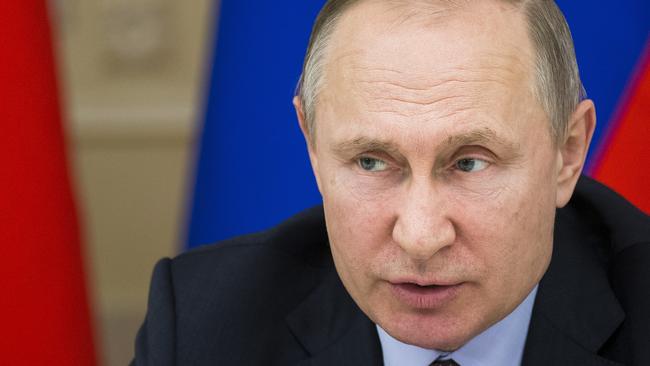
British Prime Minister Theresa May’s declaration that Vladimir Putin’s government probably organised a nerve-agent attack on former double agent Sergei Skripal and his daughter must have concrete consequences in terms of Western sanctions against Russia.
Britain is seeking Australian support as May prepares to retaliate. US Secretary of State Rex Tillerson, before he was sacked overnight, pledged the attack would “trigger a response”, saying the US would stand with Britain.
Donald Trump, however, has been extremely reluctant to impose sanctions on Russia. This is a moment when every democratic nation should stand together, with May’s deadline for Moscow to come clean or face sanctions to expire early today.
One of the most important elements of the new world disorder, the unravelling of any rules-based system, is that Western nations cannot effectively sanction most of the countries that operate outside the rules, especially big, powerful states such as Russia.
Under Putin’s leadership, Russia has invaded and conquered sovereign territory of Ukraine, has brazenly interfered in US democratic elections and has developed a profoundly disturbing habit of assassinating Russian critics who live abroad, especially in Britain.
It is not absolutely certain that Moscow was behind the March 4 attack on Sergei and Yulia Skripal in Salisbury, England, but May would not have made the accusation without a high degree of confidence. Similarly, Tillerson backed the British judgment.
The nerve agent used on the Skripals, Novichok, is exclusively developed and used by Russia.
Over the past few years, the Russian state has been adept at carrying out acts of aggression with lightly disguised forces, about which it can claim no knowledge or direct control. This was particularly the case in Ukraine.
However, as Putin approaches re-election on Sunday — and, like so many strongman rulers today, seeks to ride a wave of unbridled nationalism — his government is becoming more brazen.
Tillerson says that after the Trump administration has spent a year trying to work out a constructive modus vivendi with Moscow, Putin’s government has undertaken a “pivot” to increased aggressiveness.
When the US and its allies comprehensively dominated the global economy, the power of Western sanctions was awesome.
Now, there are other centres of economic power. These dilute the force of Western sanctions. The most notable is China. But there are others as well. India, while a 24-carat democracy, is much less likely to join in Western sanctions if its own interests are not directly engaged. This is true of numerous emerging economic powerhouses.
This means the rules-based system is increasingly likely to break down. The West has been perhaps too promiscuous with sanctions in cases that don’t really merit them.
But where they are merited they should be applied with force and rigour.
The Skripal case looks eerily similar to that of Alexander Litvinenko — like Skripal, a former spy who was murdered in 2006 on British soil. A British inquiry found this was almost certainly the work of Moscow. When the inquiry reached its conclusions, London did not take serious actions against Russia. The results of that forbearance were not encouraging.
Britain should not make the same mistake again.







To join the conversation, please log in. Don't have an account? Register
Join the conversation, you are commenting as Logout